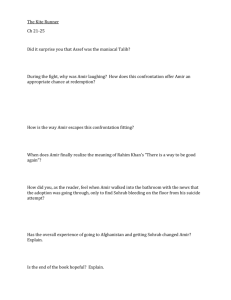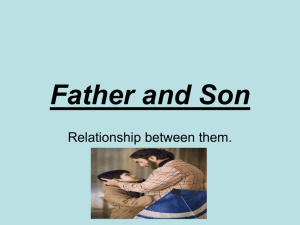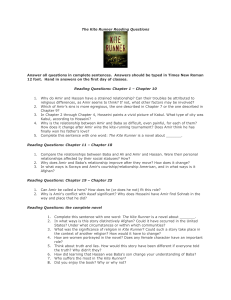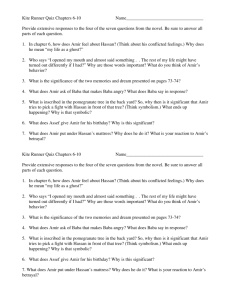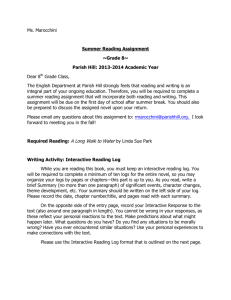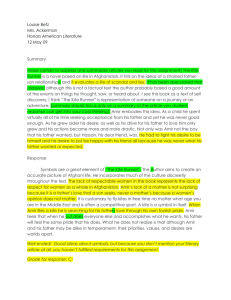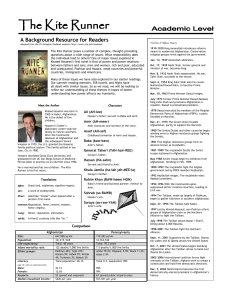The Kite Runner Guide
advertisement
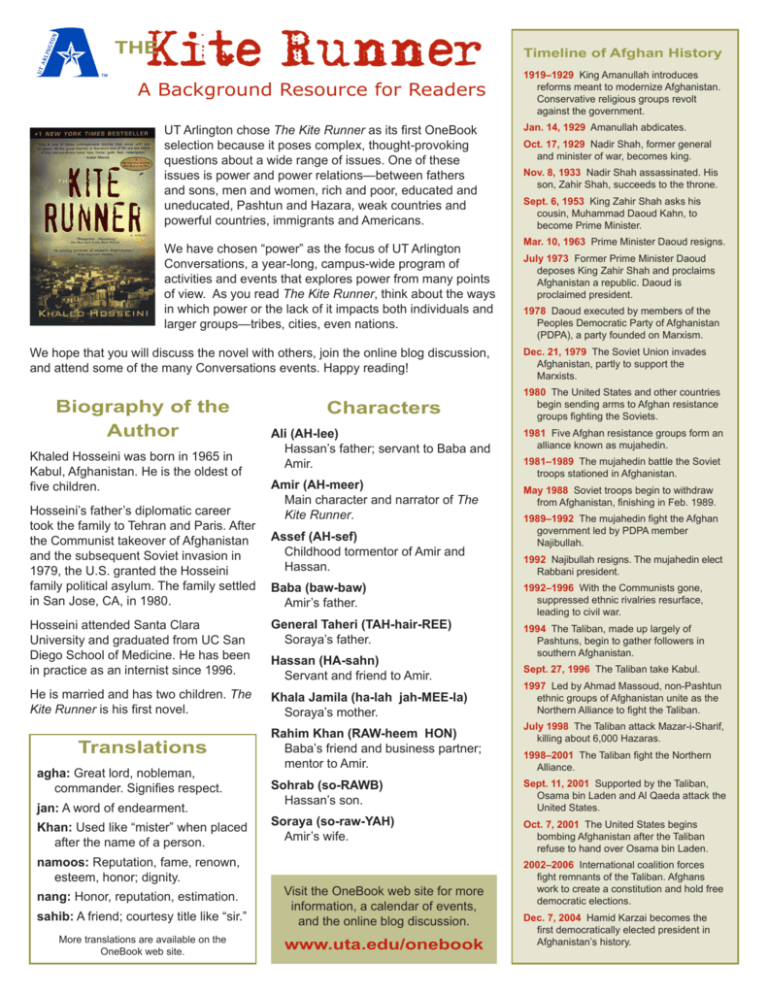
Kite Runner THE A Background Resource for Readers UT Arlington chose The Kite Runner as its first OneBook selection because it poses complex, thought-provoking questions about a wide range of issues. One of these issues is power and power relations—between fathers and sons, men and women, rich and poor, educated and uneducated, Pashtun and Hazara, weak countries and powerful countries, immigrants and Americans. We have chosen “power” as the focus of UT Arlington Conversations, a year-long, campus-wide program of activities and events that explores power from many points of view. As you read The Kite Runner, think about the ways in which power or the lack of it impacts both individuals and larger groups—tribes, cities, even nations. We hope that you will discuss the novel with others, join the online blog discussion, and attend some of the many Conversations events. Happy reading! Biography of the Author Khaled Hosseini was born in 1965 in Kabul, Afghanistan. He is the oldest of five children. Hosseini’s father’s diplomatic career took the family to Tehran and Paris. After the Communist takeover of Afghanistan and the subsequent Soviet invasion in 1979, the U.S. granted the Hosseini family political asylum. The family settled in San Jose, CA, in 1980. Characters Ali (AH-lee) Hassan’s father; servant to Baba and Amir. Amir (AH-meer) Main character and narrator of The Kite Runner. Assef (AH-sef) Childhood tormentor of Amir and Hassan. Baba (baw-baw) Amir’s father. Timeline of Afghan History 1919–1929 King Amanullah introduces reforms meant to modernize Afghanistan. Conservative religious groups revolt against the government. Jan. 14, 1929 Amanullah abdicates. Oct. 17, 1929 Nadir Shah, former general and minister of war, becomes king. Nov. 8, 1933 Nadir Shah assassinated. His son, Zahir Shah, succeeds to the throne. Sept. 6, 1953 King Zahir Shah asks his cousin, Muhammad Daoud Kahn, to become Prime Minister. Mar. 10, 1963 Prime Minister Daoud resigns. July 1973 Former Prime Minister Daoud deposes King Zahir Shah and proclaims Afghanistan a republic. Daoud is proclaimed president. 1978 Daoud executed by members of the Peoples Democratic Party of Afghanistan (PDPA), a party founded on Marxism. Dec. 21, 1979 The Soviet Union invades Afghanistan, partly to support the Marxists. 1980 The United States and other countries begin sending arms to Afghan resistance groups fighting the Soviets. 1981 Five Afghan resistance groups form an alliance known as mujahedin. 1981–1989 The mujahedin battle the Soviet troops stationed in Afghanistan. May 1988 Soviet troops begin to withdraw from Afghanistan, finishing in Feb. 1989. 1989–1992 The mujahedin fight the Afghan government led by PDPA member Najibullah. 1992 Najibullah resigns. The mujahedin elect Rabbani president. 1992–1996 With the Communists gone, suppressed ethnic rivalries resurface, leading to civil war. Hosseini attended Santa Clara University and graduated from UC San Diego School of Medicine. He has been in practice as an internist since 1996. General Taheri (TAH-hair-REE) Soraya’s father. He is married and has two children. The Kite Runner is his first novel. Khala Jamila (ha-lah jah-MEE-la) Soraya’s mother. 1997 Led by Ahmad Massoud, non-Pashtun ethnic groups of Afghanistan unite as the Northern Alliance to fight the Taliban. Rahim Khan (RAW-heem HON) Baba’s friend and business partner; mentor to Amir. 1998–2001 The Taliban fight the Northern Alliance. Translations agha: Great lord, nobleman, commander. Signifies respect. jan: A word of endearment. Khan: Used like “mister” when placed after the name of a person. namoos: Reputation, fame, renown, esteem, honor; dignity. Hassan (HA-sahn) Servant and friend to Amir. Sohrab (so-RAWB) Hassan’s son. Soraya (so-raw-YAH) Amir’s wife. sahib: A friend; courtesy title like “sir.” Visit the OneBook web site for more information, a calendar of events, and the online blog discussion. More translations are available on the OneBook web site. www.uta.edu/onebook nang: Honor, reputation, estimation. 1994 The Taliban, made up largely of Pashtuns, begin to gather followers in southern Afghanistan. Sept. 27, 1996 The Taliban take Kabul. July 1998 The Taliban attack Mazar-i-Sharif, killing about 6,000 Hazaras. Sept. 11, 2001 Supported by the Taliban, Osama bin Laden and Al Qaeda attack the United States. Oct. 7, 2001 The United States begins bombing Afghanistan after the Taliban refuse to hand over Osama bin Laden. 2002–2006 International coalition forces fight remnants of the Taliban. Afghans work to create a constitution and hold free democratic elections. Dec. 7, 2004 Hamid Karzai becomes the first democratically elected president in Afghanistan’s history. Think About... Power • Notice how material circumstances (class, gender, nationality, age) contribute to—perhaps even determine—access to power. Track shifts of power that occur in the novel—for Baba, Amir, Hassan, Soraya, Assef. • In what ways does Hassan have power over Amir, though Amir’s position is one of wealth and privilege? • At a key point in the story, Hassan refuses to defend himself. Can his decision be seen as an exercise of power? To what extent is his choice culturally determined? How does being an American reader shape your reaction to his choice? Identity and self-determination Amir says, “That Hassan would grow up illiterate like Ali and most Hazaras had been decided the minute he had been born” (28). In what ways are our lives scripted for us? How does Amir make choices that violate the “script” he’s been given by his ethnicity, class, and/or gender? Friendship When Hassan says, “Amir agha and I are friends,” Assef laughs and calls him a “pathetic fool” (72). Can people of unequal class and status ever be true friends? Does Amir ever become a true friend to Hassan and if so, when and how? Guilt The Kite Runner can be read as a journey from guilt to redemption. Think about the nature of the various “sins” Amir commits in regards to Hassan. Of what is Amir guilty? (Avoid the easy answers here.) The immigrant experience and the American dream Amir says, “Baba loved the idea of America. It was living in America that gave him an ulcer” (125). What elements of the American dream does the novel challenge? How does seeing America through Baba and Amir’s eyes change your own ideas about the United States? Afghanistan and Texas Afghanistan Texas Size: 647,500 sq km 691,030 sq km Population: 31,056,997 22,270,165 Life expectancy: Total: 43.3 years Total: 77.2 years Infant mortality rate: 160.23 deaths/1,000 live births 6.6 deaths/1,000 live births Ethnic groups: Pashtun 42%; Tajik 27%; Hazara 9%; white 72%; Hispanic 14.5%; Uzbek 9%; Aimak 4%; Turkmen 3%; black 11%; Asian 3% Baloch 2% Languages: Afghan Persian or Dari 50%; Pashtu 35%; Turkic languages (primarily Uzbek and Turkmen) 11%; much bilingualism English only 66%; Spanish 29%; Asian and Pacific Islander 2% Literacy (age 15+ can read and write): Male: Female: Total population: 36% Total U.S. population: 99% 51% 21% 99% 99% Telephones: 0.1 telephone lines per 10 people 6.6 telephone lines per 10 people Television broadcast stations: At least 10 for entire country 31 in the Dallas-Fort Worth area alone Airports: 46 (paved and unpaved runways) 392 (public airports only) Paved roadways: Total: 5,114.5 miles Total: 79,000 miles of farm-to-market, ranch-to-market, state, U.S. and interstate highways Redemption • After his brutal fight with Assef, Amir says, “My body was broken . . . but I felt healed. Healed at last” (289). Explain that in both psychological and spiritual terms. • At age 12 Amir assumes a burden of guilt that haunts him throughout his life. What enables him to be free of guilt at last? Consider the passage on p. 359 that begins, “I wondered if that was how forgiveness budded...” Sources for information in this handout can be found at www.uta.edu/onebook. Compiled by Dr. Laurin Porter (English Professor and Co-Chair, Conversations Team) and Evelyn Barker and C.D. Walter (UT Arlington Library). Special thanks to Joshua Been and Abdul Kelani, UT Arlington Library.
